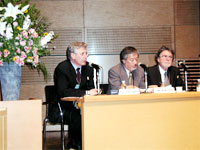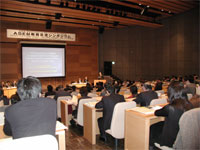Symposium Report
ASEM Symposium on Educational Exchange
17-18, November 2003, Tsukuba, Japan
 |
 |
December, 2003
ASEM Division, Ministry of Foreign Affairs, Japan
The Government of Japan hosted the ASEM Symposium on Educational Exchange on 17 and 18 November, 2003, at Tsukuba, Japan, in cooperation with Asia-Europe Foundation (ASEF). With the audience of more than 100, the panelists exchanged their views on bi-regional educational exchanges of their countries as well as future tasks for further promotion of the exchanges.
Professor and Dr. Mineo Nakajima, Secretary-General of the University Mobility in Asia and the Pacific (UMAP) served as the chairman of the symposium. Following the opening ceremony, two keynote speeches were delivered: Professor Tsutomu Kimura, President of the National Institute for Academic Degrees and University Evaluation, on the importance of guaranteeing the quality of higher educational institutions in the globalizing world and increased opportunities for educational exchanges; and by Dr. Michael Reiterer, Deputy Head of Delegation, Delegation of the European Commission in Japan, on the details of ASEM since its establishment, its significance, and its projects and initiatives including the field of education.
Five sessions were held under different themes. Some of the important elements raised during the discussions are:
- Importance of quality assurance of higher education after achieving quantity targets of educational exchanges
- Importance of the language skills / balance between English and the local languages
- Database development to further promote bi-regional educational exchanges
The summary of each session is as follows.
- Student exchange at university level
Current situations on student exchange at university level and suggestions on how to promote exchange programs between Asia and Europe
Moderator: Professor Toyosaka Moriizumi, Tokyo Institute of Technology- Following the fact that Japan's "Plan to Accept 100,000 Foreign Students" has been achieved and the Central Council for Education compiled a mid-term report on "Development of New Student Exchange Policy" this year, Dr. Seizo Miyata, President, Tokyo University of Agriculture and Technology, emphasized the importance of focusing on international students' "quality" in addition to "quantity" in the future.
- Dr. Keuk-Je Sung, Secretary-General of Secretariat for ASEM-DUO Fellowship, introduced the mechanism of the Fellowship, in which paring institutions from Asia and Europe jointly apply for scholarships for the exchange of students and researchers. The Fellowship is funded by four of the ASEM partners.
- Professor Rodney Thom of the University College Dublin explained the current European situations on student exchanges with Asia. He introduced exchange programs between Irish and Asian universities and pointed out the recent tendency that the acceptance of Asian students is seen as financial resources in Europe.
- Following the presentations, the panelists and the discussants together with the audience exchanged views on further promotion on educational exchanges.
- Issues on international students living in foreign countries
Acceptance of international students, their stay in foreign countries, and how to support international students' life
Moderator: Professor André Siganos, Embassy of France- Dr. Yukuo Abe, Director of International Student Centre, University of Tsukuba, explained the necessity of 1) pursuing a certain level of language skill; 2) providing good accommodation and 3) enhancing the acceptance system and education quality for international students. How universities and administrative organs should cooperate in a crisis management in an international crisis, e.g. SARS, was raised.
- Ms Zhang Xiuqin, Deputy DG, Chinese Ministry of Education, explained the China's policy on international students and the present situation of a rapid increase of international students to China for the past ten years.
- Mr. Mike Winter, Deputy Director of the British Council Japan, described the British Council's information and counseling services to prospective students. He pointed out that languages and cultural adjustment were the key elements to make studying abroad a success.
- Mr. Koki Sato, President and CEO Mejiro University, brought up some issues such as how to overcome discrimination and prejudice following the acceptance of international students and how to financially support them.
- Dr. Georgio Campanaro, Deputy Director of Italian Cultural Institute, added that educational exchanges directly related to our future. Hence, futuristic views would be necessary when considering educational exchange policies.
- The panelists discussed different approaches, such as giving education in English to increase the number of foreign students, and pursuing local-language education to maintain cultural and language diversity.
- High school student exchange
Reports on current situations on high school student exchange and suggestions on how to promote exchange programs between Asia and Europe
Moderator: Mr. Peter Tan Hai Chuan, Embassy of Singapore- Professor Kumiko Torikai, Rikkyo Graduate School of Intercultural Communication, explained the situation on Japan's high school student exchange. It included that: Many students study abroad to obtain English language skill; There are many cases that parents oppose their children's studying abroad; And high school students who study in a non-English speaking country tend to deepen their understanding of the country's life and culture more than those in an English-speaking country. The importance of ASEM to promote Asia-Europe exchanges was pointed out.
- Mrs. Remedios L. Celi, National Director, YFU/Philippines, called attention to the fact that financial problems make Filipino students difficult to study abroad. The importance of financial support by rich countries to promote education exchange was emphasized.
- Mr. Mich Petersmann, National Director, AFS Germany, started his presentation with the history of AFS programs since its establishment after World War II and reported that more European students go to Asian countries recently, shifting the destination from the U.S.A. He stressed the importance of diverse cultural experiences that benefit high school students.
- Information sharing on educational exchange
Toward a creation of information sharing mechanism that will facilitate educational exchange between Asia and Europe, including a creation of database
Moderator: Professor Yorizumi Watanabe, Deputy Director-General, Economic Affairs Bureau, Ministry of Foreign Affairs of Japan- Professor Yorizumi Watanabe gave his views on Japan-Europe relations from cultural perspectives. He said that the cultural differences indicate that we need to promote further exchange of people and proposed setting up of a database on ASEM-wide exchange programs to facilitate more bi-regional educational exchanges.
- Mr. Zainal Mantaha, Director of People-to-People Exchange, Asia-Europe Foundation (ASEF), expounded on ASEF activities and reported on "the 2nd ASEM Educational Hub Meeting." He also raised some points for consideration regarding database development.
- Dr. Michael Reiterer, Delegation of the European Commission in Japan, explained the Commission programs to promote education exchange with Asia and the Erasmus Programme. He also mentioned the necessity to make proposals to solve the problems raised in the symposium.
- Dr. Mineo Nakajima, Secretary-General of UMAP, said that ASEF should play a central role to set up such a database and promote Asia-Europe education exchange. He explained the credit transfer system that was developed under UMAP for higher student mobility. Professor Thom of Ireland pointed out that, when the essential roles that ASEF and ASEM could play in Asia-Europe relations were considered, ASEF and ASEM need to make further efforts to publicize their activities.
-
Exchanges of views with the audience and international students
Moderator: Dr. Yukuo Abe, University of Tsukuba- Mr. Mohad Ghazali, a student from Malaysia, said the facility of receiving educational institute, living environment as well as community support for his family were the key issues when he was making a decision to study in Japan. English-speaking volunteers play important roles as well in supporting international students in Japan.
- Mr. Cui Yi Bin from China reflected positively on his life as a Japanese government scholarship student with support by his professors and staff of his university.
- Mr. Elia Bouthors, who stayed in Japan as a business major student from France, pointed out that European students who aim to gain international-standard competitiveness opt to study in Singapore or Hong Kong rather than in Japan, mainly because of the languages.
- Chair's summary
- Considering the fact that the OECD and UNESCO are jointly working on the possibility of setting up a database, a possible ASEM database may focus on collecting and providing basic data on education exchange to start with.
- It is also important to find out the ways to improve the existing exchange programs in the future.
Back to Index
